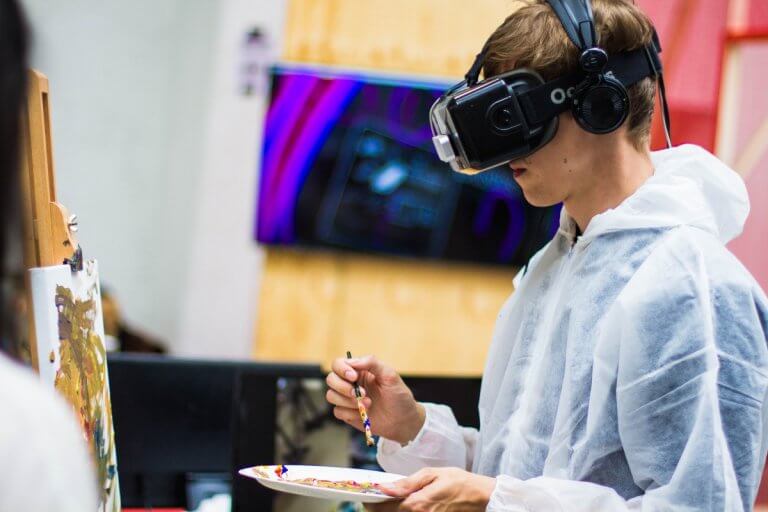
An ancient Hebrew proverb says: “Do not confine your children to your own learning, for they were born in a different time.”
In our tech-driven world, this ancient proverb is more relevant now than ever before. A survey conducted by MidAmerica Nazarene University found that technology’s place in the classroom is necessary, not just supplementary, in the digital age:
- 73 percent of students use a tablet or laptop in the classroom everyday
- 66 of schools supply smart devices, with 25 percent of students bringing their own devices into the classroom
- 86 percent of classrooms are equipped with WiFi
Technology certainly makes learning more accessible for disadvantaged students, and while many educators and parents rightly worry about tech-related distractions, EdTech is increasingly becoming a vital component of the learning experience:
“For almost the entire history of education, the model has been textbook-based where students are expected to absorb much of the subject matter through reading. That style of learning doesn’t suit every student, and it’s not universally accessible,” notes Allison Harden, Senior Vice President of the financial group Macquarie Capital.
Thanks to a significant increase in demand, education technology (EdTech) is one of the fastest-growing sectors in the UK, with four percent of all digital companies offering EdTech services and products.
EdTech start-ups seek to make learning cheaper, more accessible, and perhaps most importantly, more fun and engaging for students of all ages. Here are just four UK-based EdTech start-ups to watch in 2019.
Save cash on textbooks with Perlego
Although textbooks no longer form the foundation of classroom learning, they’re not quite obsolete yet – and for university students, they cost a pretty penny.
According to Save the Student’s annual National Student Money Survey, the average UK university student spends £20 per month on textbooks. That equates to £720 over the course of an undergraduate degree.
This places undue strain on financially-disadvantaged students who already struggle to pay tuition costs, housing fees and costs of living. The Daily Californian also found that first-year students only complete 60 percent of their assigned reading, making the expense even less necessary.

Textbooks can cost a pretty penny for already cash-strapped students. Source: Element5 Digital/Unsplash
Perlego’s subscription-based textbook service aims to take some of that financial burden off students’ shoulders. Offering more than 200,000 textbook and non-fiction titles, students can effectively ‘rent’ their textbooks as and when they need them, rather than shelling out hundreds of pounds for a book they’ll only use once.
Perlego’s most budget-friendly plan starts at £10 per month, which comes out even cheaper with the 20 percent student discount. Perlego’s 14-day free trial also lets students ‘try before they buy’, which is especially useful for finding out whether a course’s books are available on the service.
Make your own molecules with Interactive Scientific
“The current reality of science education is that we expect students to understand and learn about something they have never really seen.”
Interactive Scientific’s Nano Simbox Education app seeks to change that, using 3D molecular simulations to “bring invisible science to life in the classroom”. While Nano Simbox Education is still being developed for use in academic research labs, the programme is already available in K-12 classrooms.
Dr Nick Norman, professor of Inorganic Chemistry at the University of Bristol, is excited to see Interactive Scientific’s app in action:
“To be able to immerse oneself in a dynamic and fully interactive 3D environment will offer an unparalleled opportunity for both teacher-demonstrated and student-centered learning.”
Interactive Scientific, and its CEO Dr Becky Sage, have accumulated some impressive accolades for their work, including the 2016 Innovate UK Infocus Award. Dr Sage was also named one of London Tech Week’s 30 Change-Makers of 2018.
Make learning English fun and friendly with Little Bridge
London-based Little Bridge teaches English to K-12 students in more than 10,000 schools around the world using fun activities and games. Students can also practice their developing language skills with other Little Bridge users around the world through a moderated online community.
Little Bridge’s products meet international language learning standards, including the Cambridge Young Learners English Tests and the Common European Framework, laying an excellent foundation for future international undergraduate students and globe-trotter hopefuls.

Sixty-six of schools supply smart devices, with 25 percent of students bringing their own devices into the classroom. Source: Shutterstock
A basic, free account option offering access to select learning activities and the online community makes Little Bridge an excellent choice for small classrooms with no more than 20 students. Activity books and even family account options are also available for parents to help their kids hone their English skills at home.
Learn more about how Little Bridge is revolutionising English language learning from China to Chile.
Fit your learning around your life with FutureLearn
In the past 10 years, free online learning platforms like Coursera and Khan Academy have gained popularity with a diverse population of learners.
FutureLearn, a UK-based online learning platform owned by The Open University, has partnered with dozens of universities worldwide to offer short courses, academic accredited programmes, and even fully-fledged undergraduate degrees.
Students can access FutureLearn’s short courses for free as long as they’re in session. Paid options include Certificates of Achievement and lifetime access to short courses.
FutureLearners can choose to pursue a full undergraduate degree for as little as half the cost of a traditional undergraduate degree programme at a UK university. FutureLearn’s degree programmes span a variety of subjects, from Development and Humanitarian Action to Entrepreneurship.
For those looking to enhance their CVs or earn certification in a skill or subject, Certificates of Achievement are available, starting at £39. Pricing for unlimited access to FutureLearn’s short courses starts at €239 per year. The unlimited package also includes complimentary taster courses for FutureLearn’s degree programmes.
Wrapping up: the two sides of the EdTech coin
With all sorts of doomsday reports about the AI apocalypse and technology’s negative effects on our health, many parents, educators and institutions are hesitant to fully integrate virtual reality and similar technologies in the classroom.
It’s important to remember, though, that everything has its pros and cons. Here’s some food for thought on the role of EdTech, particularly virtual reality, from Jeremy Bailenson, Director of Stanford University’s Virtual Human Interaction Lab:
Work smarter, not harder! Now is the time for schools to take advantage of #EdTech https://t.co/Js5bl8uFJJ pic.twitter.com/QGyDQHTxUA
— Parentapps (@ParentAppsUK) April 8, 2019
“When I think about virtual reality, I think virtual reality is like uranium: it’s this really powerful thing. It can heat homes and it can destroy nations. And it’s all about how we use it.”







